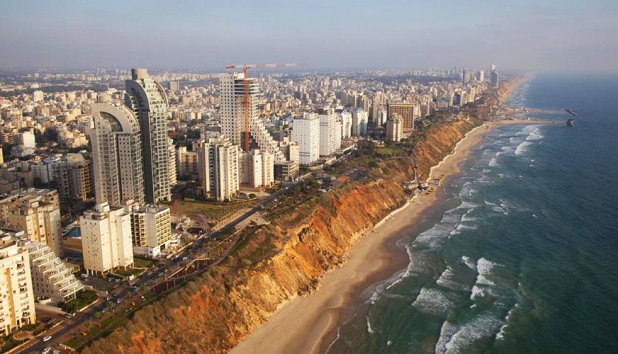This past July in Netanya during the Israel-Hamas war, I spoke with Jacques, a middle aged Jew who had immigrated from France a few years ago, as he was taking his poodle out for a walk.
It was just after anti-Israel protesters who were supporting Gazan Palestinians had trapped hundreds of Jews in a Paris synagogue, hurling stones and bricks at the building, and after seven other synagogues in France were attacked in the space of a week. And it was before a poll done last summer showed 16 percent of French citizens expressed support for the Islamic State .
Jacques said to me, “All of my extended family still live in France and want to move to Israel now. It’s just a question of how to arrange it. It’s not simple. It will take some time to make it work economically. But they will all come.”

Jean de Paris Coffuire,in Netanya square. Photo taken several years ago, by Rhonda Spivak
I remembered his comment, thinking that it was in its own way remarkable. Even when much of Israel was being bombarded with Hamas rockets, and Israelis were running in and out of bomb shelters, Jacques’s family would nonetheless want to make aliyah rather than feel vulnerable in France.
Over the last 8 years, ever since I have spent summers in Netanya, more and more French Jews have been buying “second safe homes” or making aliyah to this city that is billed as “the French Riviera”, where the sandy beaches are much nicer than any pebble stoned beach I have ever seen in Nice, France. The pace of that aliyah quickened given that Jews were the target of 40 percent of all racist crimes in France in 2013, according to the European Jewish Congress and Tel Aviv University.
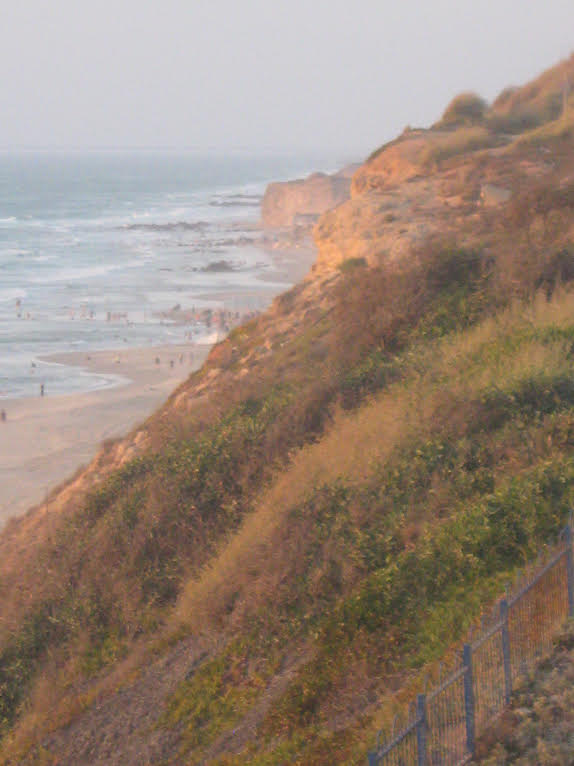
Netanya seaview photo by Rhonda Spivak
When I first began spending summers in Netanya, it was not long after French Jews were still in shock over the Ilan Halimi disaster when a young French Jew, Halimi was kidnapped, taken to a slum apartment and tortured for over 20 days by a group of French Muslims. He was dumped handcuffed, naked, stabbed and suffering from third degree burns over two-thirds of his body, at a railway siding in Paris.
Already then, there were numerous French Jews flying the four hour flight from Paris to Tel-Aviv, and then coming to Netanya , to buy a “second home,” as an insurance policy in case anti-Semitism in France increased. They would arrive for only a day or two and arrange to see available apartments to buy on the seafront Nitza Avenue, or new apartment complexes being built (many with French names) with sea views. They would make a quick decision as to which to buy, put down a deposit, and fly back to France. I heard stories of some who would hire contractors to gut an existing apartment, pay them in cash, fly back to France and then return to Israel when the apartment was ready a few months later.
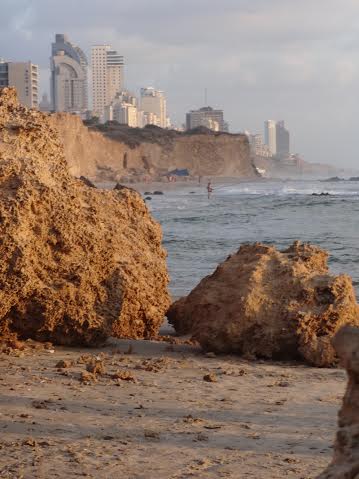
Netanya sand cliffs and skyline photo by Rhonda Spivak
Already then in 2005-6, I met French Jews who came to vacation in Netanya who said that they were frightened to put a mezuzah on the outside of their door, for fear of radical Muslim youth who would throw eggs or other items on their homes. They spoke then of being worried about wearing a kippah in public, for fear of harassment. Even when Israel was at war with Hizbollah in the summer of 2006, Netanya was virtually the only place in Israel where the real estate market was still active. There were still French Jews who came during the war and purchased apartments, being more fearful of the spread of anti-Semitism in France than of war with Hizbollah. (Although Hizbollah rockets hit nearby, none fell in Netanya in the 2006 war). Numerous real estate agencies advertise themselves with the French word “immobilier”. For years now, real estate prices in Netanya, a city of about 200,000 have risen partly due to French Jews buying second homes near the sea. While French Jews are also attracted to Jerusalem and Tel Aviv and the southern coastal city of Ashdod , this past year the largest number, 2000, made their home in Netanya.
Over the years, I have encountered the phenomenon of “Boeing Aliya”, where a French Jewish family moves to Israel, but the family maintains its business in France and the breadwinner returns to France every couple of weeks or monthly to run the business. My daughter became friendly with a French Jewish girl, who lived with her mother, a real estate agent, and sister in Israel, while her father ran a business in France returning for the Jewish holidays and for other stretches of time. The family would return to Paris to visit him for part of the summer.
This past summer I spoke with a mother who had immigrated to Israel with her family a few years ago from Paris, found her son, now in the IDF being called up to Gaza to fight in this summer’s war. Yes, she was worried about him, but she had no regrets about having moved from France. The French Jews I have encountered who have moved to Israel have always told me that in Israel they feel at home, and more in control of their destiny than in France.
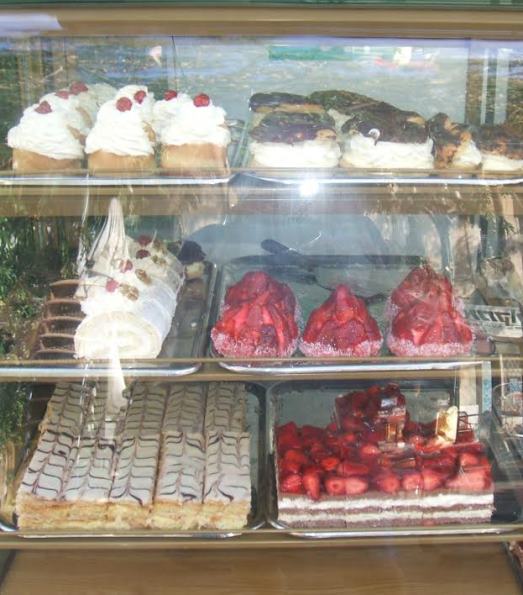
French pastries at bakery in Netanya, Independence Square photo by Rhonda Spivak
Netanya has long been a magnet for French Jews, and every summer I have witnessed the influence of French Jews in its town square, called “Kikar Atzmaut” (Independence Square). Chez Claude, a falafel and shwarma joint owned by French immigrants, at one end of the square is popular with town locals and French tourists, who flock to Netanya in the summer, particularly in August when it is the “Grande Vacance” in France. Elsewhere in Independent Square, one can see patisseries with window displays of chocolate eclaires and other French pastry, as well as, restaurants making “crepes” and “gaufres” (waffles), with practically every restaurant offering a “salade nicoise,” while hair salons offer “coiffure.” Since most of the French Jews who have moved to Netanya and who come as tourists are on the whole traditional, most of the restaurants and shops in the square close for Shabbat, and neighborhood synagogues for French Jews to attend are plentiful. On the street, whenever I say I am from Canada, inevitably I am asked, “From Montréal?”
Following the recent jihadist terror attacks on the kosher supermarket in Paris, the Jewish People policy institute on January 11, 2015, issued a statement saying that “… Jews in France are at a crossroads and many are now deciding what their next steps are. In addition to the deteriorating security situation, the difficult economic condition in France is playing a role in the communities’ decisions regarding whether to stay in France or emigrate to Israel, the US, Canada or elsewhere.”
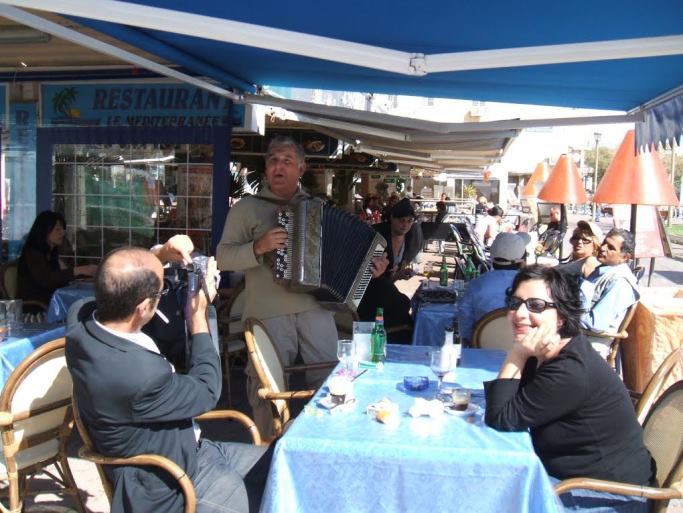
French cafe, Netanya square. photo taken several years ago by Rhonda Spivak
In 2014, for the first time France became the leading source of immigrants to Israel with almost 7,000 coming in this year, double the number from 2013, according to the Jerusalem Post.
Natan Sharansky, director of the Jewish Agency that coordinates aliyah to Israel, predicted that 15,000 French Jews would emigrate in 2015, with possibly 50,000 moving to Israel in the coming years. (There are currently about 1/2 million Jews in France).
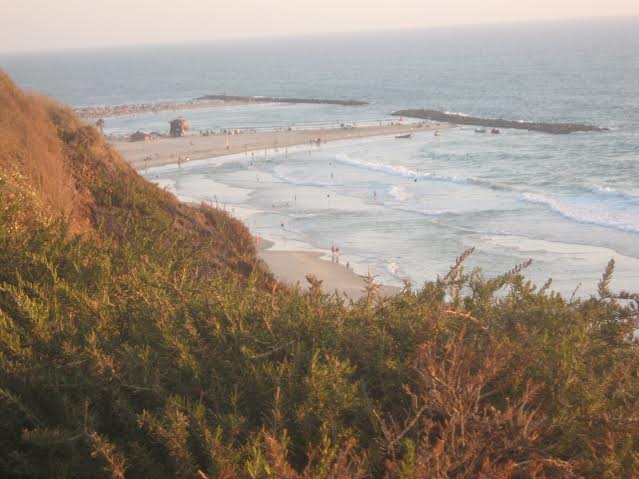
Sironit Beach, Netanya
Based on everything I have witnessed first-hand in Netanya over the last 8 years, I think Sharansky’s estimates will prove to be on the mark. This reminds me of a conversation I had in 2009 with two very pro-Palestinian Mennonite gentlemen in Winnipeg. We were talking about Israel and I explained to them that in Netanya I was meeting many Jews who had immigrated to Israel, partly because of increased anti-Semitism in France. They all told me that anti-Semitism in France would get worse, not better. I remember that the Mennonite gentlemen were rather stunned to hear this. I said that based on what I was seeing on the ground in Netanya, I was pretty sure that there would be an increase of French Jews moving to Israel over the next decade. They asked me why I was so sure of this. I answered that it was because I had studied Jewish history, and if you look at Jewish history, especially European Jewish history, once anti-Semitism reaches a certain level, it is very rare for it to go down–Unfortunately, it usually only goes up. The two Mennonite gentlemen were very quiet, and had no response.
http://www.winnipegjewishreview.com/article_detail.cfm?id=4568&sec=1&title=EDITOR%27S_REPORT:_FOLLOWING_KOSHER_SUPERMARKET_ATTACK,_NETANYA,_ISRAEL_READIES_ITSELF_FOR_INFLUX_OF_FRENCH_JEWS_





